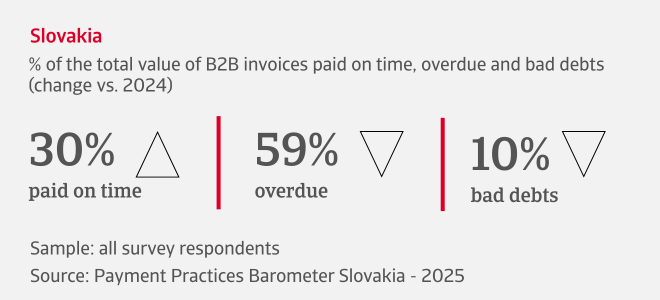
Liquidity concerns amid high levels of late payments and bad debts
A persistent challenge in managing B2B customer payment behaviour is evident in our survey of companies in Slovakia. Slower payment collection means overdue invoices now account for almost 60% of all B2B sales, a figure which reflects sustained liquidity issues among buyers. Payments are typically collected about 40 days past due, exacerbating credit risk and placing strain on credit transactions with B2B customers. As a result, bad debts now average 10% of B2B invoices, with steel and metals businesses reporting the greatest impact.

While 43% of B2B sales across all industries are transacted on credit, a risk-averse approach remains evident in the pharmaceutical sector, where most transactions continue to be conducted with upfront payments. More companies have increased their trade credit offerings in recent months to support sales with business customers, although most have kept payment terms steady. Among those who made changes, extending terms was more common than shortening them, with most invoices due within 31 to 60 days.
Looking ahead
Widespread worry over rising insolvency risk and pressure on profitability
70% of companies In Slovakia anticipate an increase in B2B customer insolvencies in the coming months amid growing unpredictability in the trading landscape. The remainder are split between those who do not foresee a rise and those uncertain about the outlook. This cautious sentiment is mirrored in expectations for payment collection. Most companies believe Days Sales Outstanding (DSO) will remain steady, but more anticipate a slowdown in collections than an improvement. This suggests concern about declining customer liquidity and increased payment delays.
A similar outlook is seen for inventory turnover, with businesses evenly split between those expecting no change and those anticipating stock build-up. This points to limited cash release from inventory and the risk of operational inefficiencies. Most companies forecast Days Payables Outstanding (DPO) to stay unaltered, but some expect a deliberate slowdown in payments to suppliers in order to preserve cash reserves. While this strategy may support short-term liquidity, it risks straining supplier relationships and increasing long-term financial exposure.
Industry insights
Pharma
Most pharma companies have kept trade credit offerings unchanged in recent months. On average 40% of B2B sales are made on credit, reflecting preference for upfront payments and controlled risk exposure. Payment terms have remained steady for most companies, typically capped at 60 days from invoicing. This restraint hasn’t improved customer payment behaviour. Late payments remain prevalent, with 60% of B2B invoices currently overdue. Persistent delays are largely attributed to liquidity constraints among buyers, tightening cash flow and increasing the risk of non-payment. Bad debts now average more than 10% of B2B invoices, underscoring growing credit losses and straining cash flow.
Steel and metals
Most companies in the sector report a strong reliance on credit and increased trade credit offerings in recent months. 47% of B2B sales are now transacted on credit despite a continued preference for upfront payments where possible. Longer payment terms are becoming more common, with most companies offering terms up to 60 days, while a significant number now extend terms beyond 90 days. This leniency reflects an attempt to remain competitive in a tight market. Overdue invoices now affect an average 68% of B2B sales. Bad debts average 10% of B2B invoices, squeezing already tight margins and disrupting cash flow.
Automotive
Most businesses report having increased their trade credit offerings, although a preference for upfront payments means only 42% of B2B sales are currently transacted on credit. Payment terms are largely steady, but some companies have shown greater leniency, extending terms beyond the common 60-day cap to more than 90 days. There has been no significant change in B2B customer payment behaviour and overdue invoices currently impact 49% of B2B transactions. Delays are often linked to long production cycles and just-in-time inventory practices. Bad debts average 7% of B2B invoices, a moderate level that nevertheless places strain on cash flow.
Interested in finding out more?
For a complete overview of the 2025 survey results for Slovakia, download the full report available in the related documents section below.
To explore more on how these insights can strengthen your own credit risk strategy, speak with us at Atradius to see how we can help you stay ahead.
- Nearly two-thirds of the sales that Slovakian companies made on credit in B2B trade in recent months are overdue. This delay in payments is causing significant financial strain on businesses
- Businesses are using a mix of bank loans and invoice financing to manage cash flow gaps, balancing the need for stability with the flexibility to handle financial pressures
- 70% of companies in Slovakia anticipate an increase in B2B customer insolvencies.
- There is widespread uncertainty about sales growth, with pessimism regarding profitability due to cost pressures and slower payment cycles
































